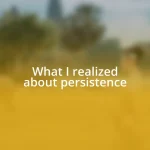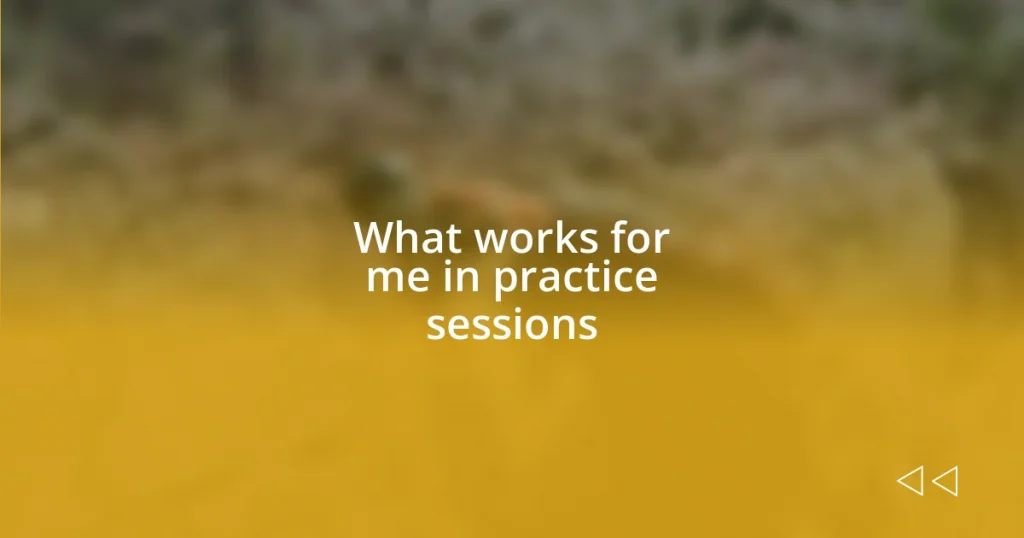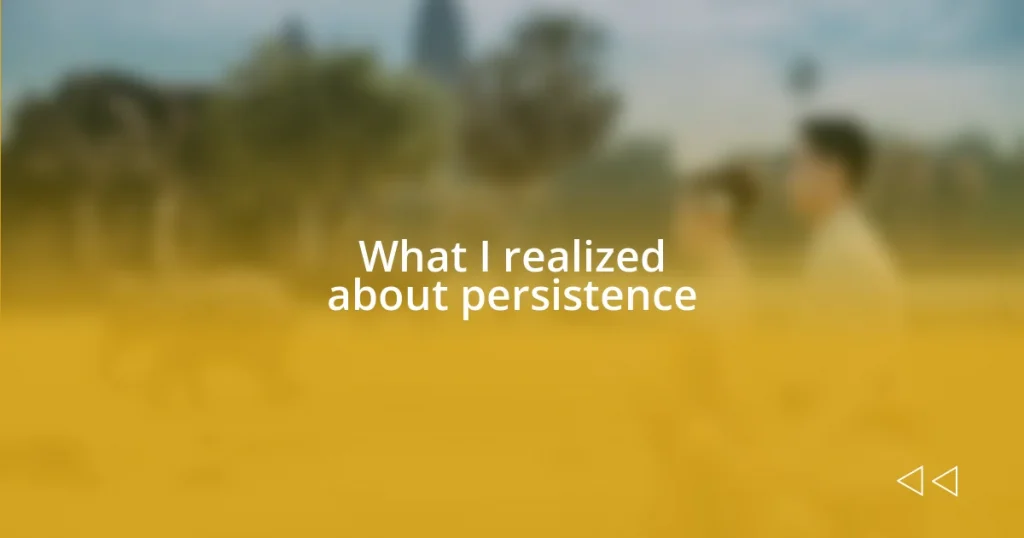Key takeaways:
- Mentorship accelerates personal and professional growth by providing guidance, accountability, and support through shared experiences.
- Different mentorship styles—directive, non-directive, and peer mentoring—cater to varied personality types and can significantly influence the learning process.
- Long-term impacts of mentorship include personal development, networking opportunities, and lasting lessons that shape both career paths and personal values.
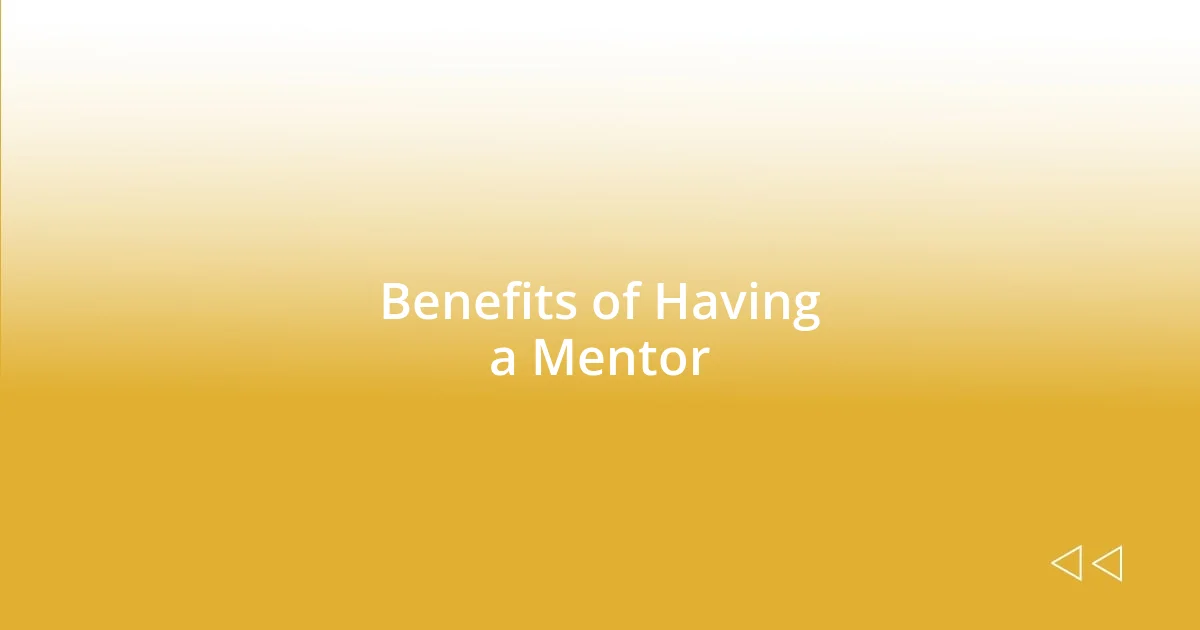
Benefits of Having a Mentor
Having a mentor can supercharge your personal and professional growth in ways you might not expect. I remember my first mentor, who not only provided guidance but also inspired me to push my boundaries. Isn’t it amazing how someone else’s perspective can illuminate paths you never considered before?
Moreover, a mentor offers a wealth of experience and wisdom, which can save you countless hours of trial and error. I once faced a tough decision at work about accepting a leadership position. My mentor shared their own challenges in a similar situation, helping me navigate my own fears and uncertainties. Can you think of a time when advice from someone who’s been there made all the difference?
Finally, the accountability that comes with mentorship is invaluable. I found that sharing my goals with my mentor ignited a sense of determination within me. Why is it that having someone believe in you can often be the catalyst for transformation? It’s a powerful reminder of how connection and support create a safe space for growth.
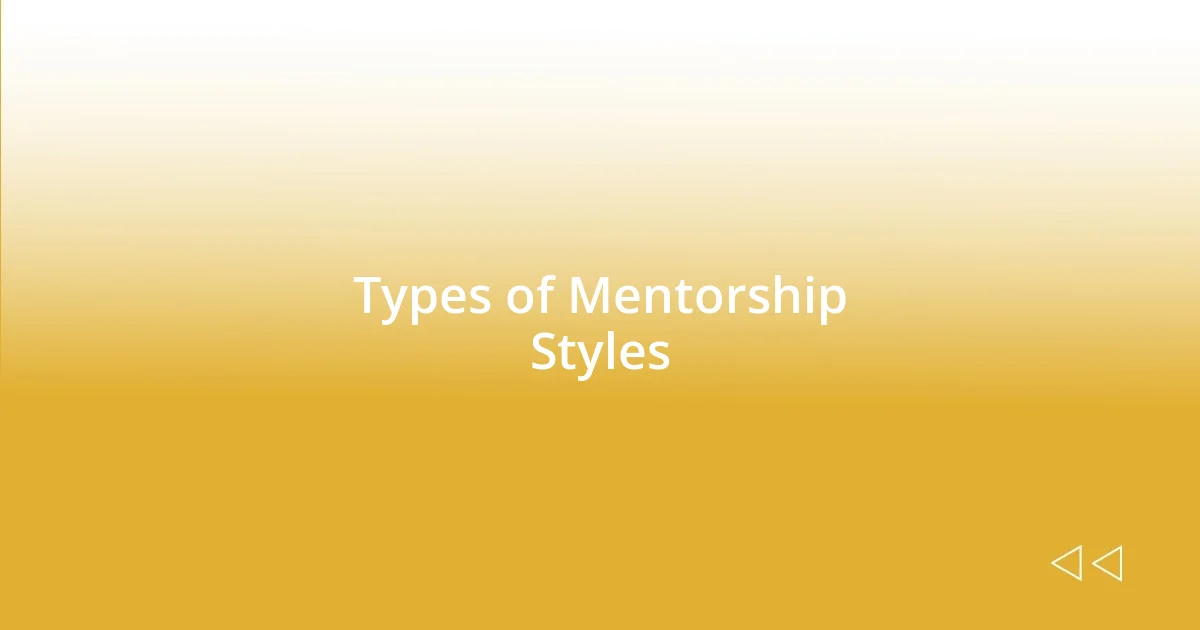
Types of Mentorship Styles
Mentorship can take on various styles, each uniquely suited to different personalities and goals. One common approach is the directive style, where a mentor provides clear instructions and advice. For me, this style was particularly helpful during my early career. I had a mentor who was decisive and straightforward, guiding me through complex projects. Their structure made it easier to focus on my tasks without feeling lost.
On the other hand, the non-directive style encourages mentees to find their own solutions. I remember a mentor I had who would ask probing questions instead of giving answers. At first, it felt frustrating to think deeply instead of receiving direct advice. However, this approach ultimately empowered me to trust my intuition and develop problem-solving confidence. So, do you prefer someone guiding you step-by-step or do you lean towards exploring options on your own?
Lastly, the peer mentoring style is a more collaborative approach where individuals at similar levels support each other. I can recall how my journey studying with a colleague helped both of us excel. We exchanged ideas, learned from each other’s experiences, and built a sense of camaraderie. That shared knowledge significantly enriched my understanding and made the process enjoyable. What style resonates with you most, and what connections have you made that influenced your growth?
| Mentorship Style | Description |
|---|---|
| Directive | Clear guidance and instructions provided by the mentor. |
| Non-directive | Mentee encouraged to find their own solutions through questioning. |
| Peer mentoring | Collaborative support between individuals of similar experience levels. |

Key Qualities of Effective Mentors
Effective mentors exhibit a range of qualities that can profoundly influence their mentees’ development. From my experience, empathy stands out as a crucial trait. An empathetic mentor not only understands your challenges but connects with you on a deeper emotional level. I recall a time when I felt overwhelmed by career pressures. My mentor took the time to listen and share their own struggles, creating a reassuring environment that helped me navigate my anxiety. That genuine understanding had a lasting impact on my confidence.
Additionally, a mentor’s ability to communicate effectively cannot be underestimated. Clear communication fosters an environment where mentees feel comfortable expressing themselves and asking questions. I remember my mentor’s knack for breaking down complex ideas into relatable concepts. It felt like talking to a friend who just got it—no condescension, just clarity. Here are some key qualities I believe make an effective mentor:
- Empathy: Understanding and sharing the feelings of the mentee.
- Effective Communication: The ability to convey ideas clearly and listen actively.
- Experience: Bodily wisdom from past experiences that can guide decision-making.
- Approachability: Making it easy for mentees to seek help without hesitation.
- Encouragement: Providing support and motivation to help mentees push through challenges.
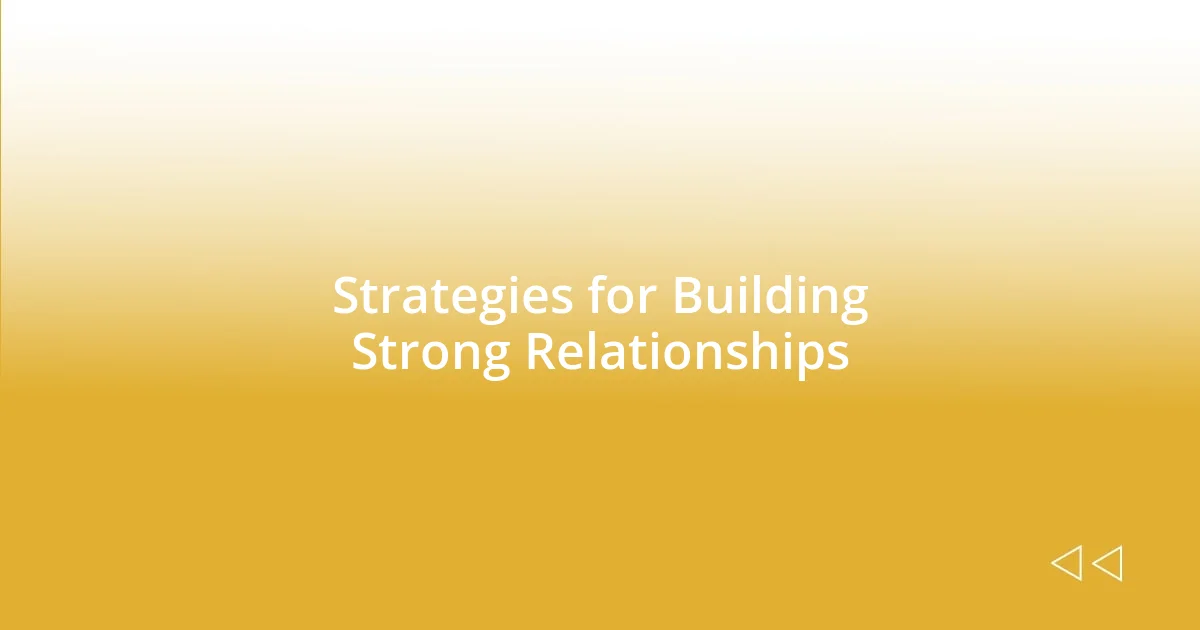
Strategies for Building Strong Relationships
Fostering trust is essential in building strong mentorship relationships. One strategy I’ve found invaluable is sharing personal experiences openly. For instance, during one of my mentoring sessions, I shared a failure I faced early on in my career. At first, it felt daunting to be so vulnerable, but witnessing my mentee’s relief when they realized they weren’t alone in their struggles was worth it. Have you ever felt that moment of connection when you shared a real story?
Another effective approach I believe in is setting aside regular, dedicated time for conversations. I once had a mentor who always made time for me, no matter how busy they were. Surprisingly, just knowing that they valued our time together made me more open and engaged during discussions. How often do you find yourself yearning for consistent support in your mentoring relationships?
Lastly, encourage an atmosphere where feedback is not just welcomed but actively sought. I once had a mentor who would ask me to rate our sessions. It seemed odd at first, but it led to much richer conversations. I learned that feedback isn’t a critique; it’s a stepping stone for growth. Have you ever considered how asking for feedback can transform your interactions?
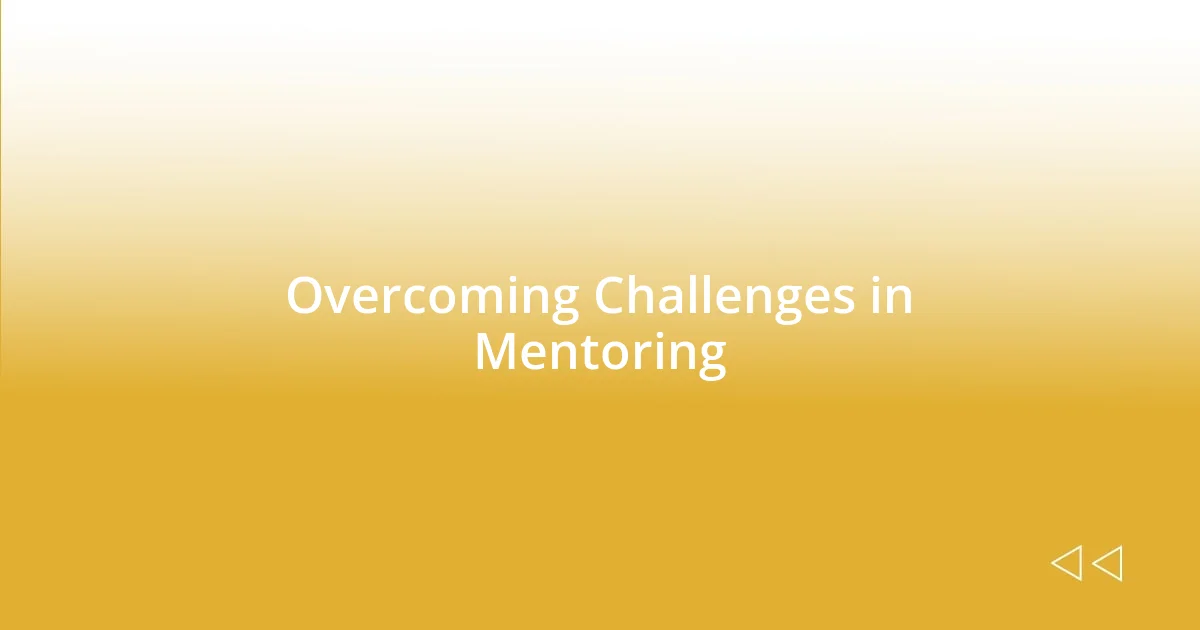
Overcoming Challenges in Mentoring
Navigating challenges in mentoring is an inevitable part of the process. I vividly remember a time when my mentee struggled with self-doubt, questioning their worth and potential. Instead of brushing off their feelings, I chose to delve deep with them, asking open-ended questions and fostering a safe space for vulnerability. This not only encouraged deeper conversations but also built trust between us. Have you experienced similar situations in your own mentoring journey?
There are moments when miscommunication can create significant roadblocks. Once, I misinterpreted my mentee’s career goals, leading us down a path that felt unproductive. After realizing this, I initiated a candid conversation where we reevaluated our objectives together. It reinforced the importance of clarity and alignment, reminding me that open dialogue is crucial for effective mentoring. Haven’t you also found that clarity can transform a relationship?
Equally important is resilience in the face of setbacks. During a particularly challenging project, my mentee faced criticism that left them discouraged. Instead of merely offering solutions, I shared my failures and the lessons I learned from them. Together, we reframed the situation, using it as a catalyst for growth rather than a deterrent. How powerful is it when we can turn setbacks into stepping stones?
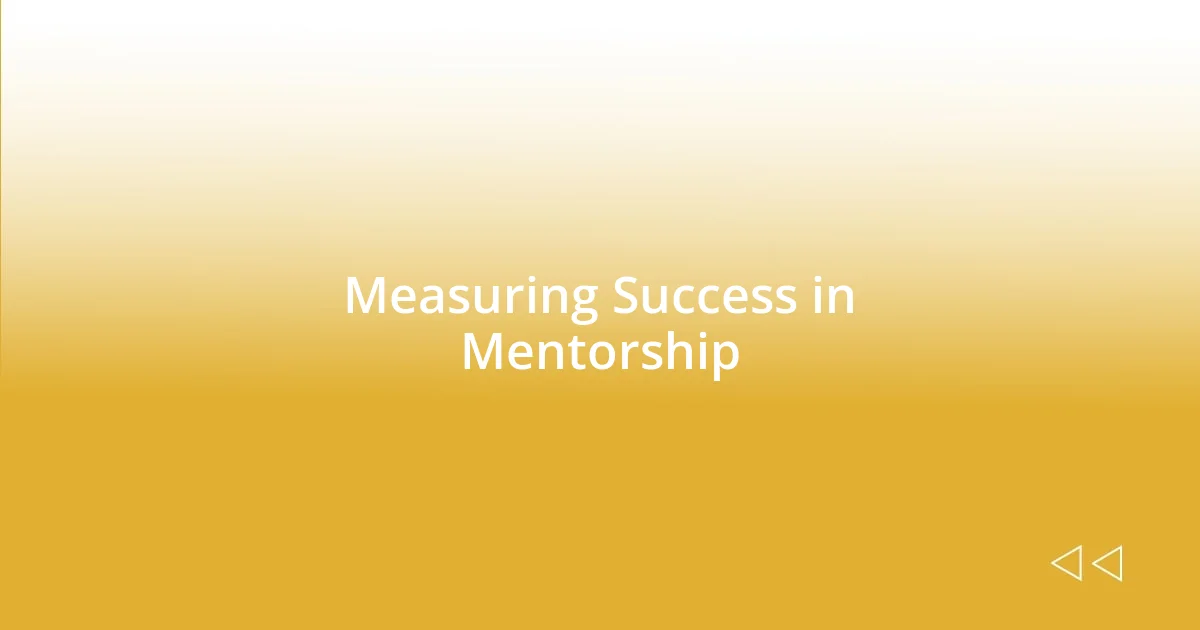
Measuring Success in Mentorship
Measuring success in mentorship can often feel elusive, yet there are tangible ways to gauge progress. I remember one mentoring relationship where we established specific goals at the outset. By revisiting those goals regularly, not only did we track advancements, but we also celebrated small victories together. Have you ever taken a moment to reflect on how far you’ve come in a relationship?
Another aspect I found crucial is the mentor-mentee feedback loop. In one of my most fulfilling experiences, my mentee created a shared document where we both recorded our insights and reflections after each session. This approach allowed us to visualize our journey and adjust our focus as needed. It’s like a guiding star that keeps us oriented—how often do you pause to assess the effectiveness of your mentoring moments?
Additionally, emotional growth shouldn’t be underestimated when measuring success. I once had a mentee who started off as quite reserved, but over time, through our discussions and shared experiences, I saw them exude newfound confidence in both their personal and professional life. This transformation was more rewarding than any achieved milestone. Isn’t it incredible how mentorship can ignite such profound changes?
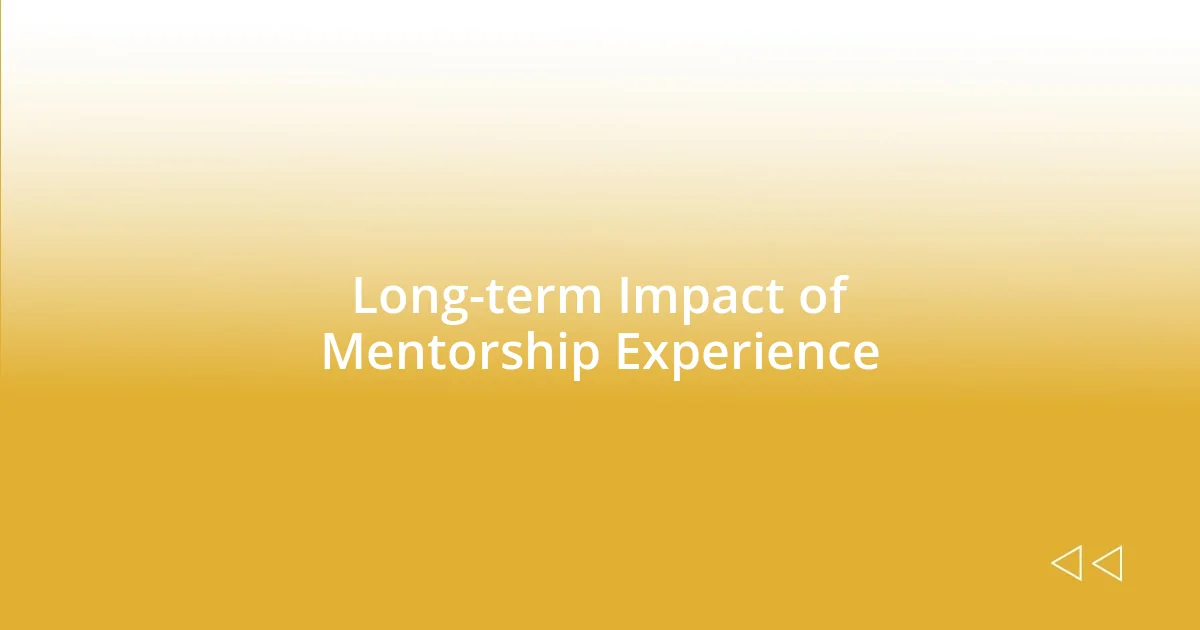
Long-term Impact of Mentorship Experience
The long-term impact of mentorship often unfolds in surprising ways. I recall a mentee who initially joined our sessions with clear career goals, but over time, our conversations naturally evolved toward personal development. Years later, I bumped into them at a conference, and they shared how our discussions had not only influenced their career path but also shaped their values and personal aspirations. Isn’t it amazing how the ripples of mentorship can spread beyond what we initially set out to achieve?
Another noteworthy aspect is the network growth that mentorship fosters. I remember introducing my mentee to a few contacts in my field, and those connections eventually opened doors they never imagined. Fast forward a bit, and they shared that these relationships had become instrumental in their career. How often do we recognize that these connections can last a lifetime, creating a web of support that’s invaluable in navigating one’s professional landscape?
Moreover, the valuable lessons learned through mentorship often resonate for years. I once faced a tough choice in my career that reminded me of the strategies I discussed with a previous mentee about decision-making and risk assessment. Reflecting on those conversations gave me clarity and strength during that challenging time. Can you think of a moment when past insights from a mentorship helped you think through a complex situation?


